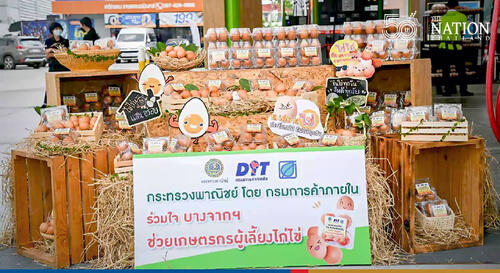Almost 1.5 Million Eggs to be Distributed at Gas Stations Amid Glut

Almost 1.5 Million Eggs to be Distributed at Gas Stations Amid Glut
On October 4th, 2021, the Nation Thailand reported that almost 1.5 million eggs will be distributed at gas stations throughout Thailand due to a COVID-related surplus. According to the report, farmers cannot distribute their produce because hotels and restaurants have not been open for service until recently and demand is still recovering. Meanwhile, October is one of the largest egg-producing months of the year. As a temporary solution, Wattanasak Sueaiam, the director general of Thailand’s Department of Internal Trade, has teamed up with three major fuel distributors who will purchase 1.45 million eggs to give away as gifts to customers at 790 locations inside the Bangkok metropolitan area and covering 13 of Thailand’s 76 provinces. The department has also offered to support management and transport fees.
Currently, only 34% of Thailand’s population is vaccinated against COVID and the nation is still recovering from a large spike in COVID cases mid-August. Although Thailand’s economy is classified as upper-middle income by the World Bank, there are massive economic disparities and 42% of Thailand’s population works in agriculture-related jobs. As evidenced by the egg crisis, the pandemic has disrupted Thailand’s agricultural economy. The government’s direct intervention in the egg crisis hints at its power over private businesses. From the 2014 coup d’etat to 2019, Thailand was ruled by a military junta, the National Council for Peace and Order, which partially repealed Thailand’s 2007 constitution and instituted martial law. In 2019, there was a Thai general election, but the election was widely considered a skewed race which gave coup leader General Prayut Chan-o-cha an unfair advantage. As a result, Thailand is effectively ruled by a military government and operates using an economic model of state capitalism.
In 2017, the Thai government unveiled its “Thailand 4.0” plan to shift away from an agricultural economy. However, according to Somchai Jitsuchon, research director for inclusive development at the Thailand Development Research Institute, the plan will require the import of foriegn specialists, which will be opposed by local professional associations. Jitsuchon also remarks that Thailand’s economic development is stunted by the fact that only 56% of its population has access to the internet. In my opinion, Thailand will not be able to transition away from an agricultural economy until there is greater political stability. The Thailand 4.0 plan is overly optimistic of Thailand’s ability to modernize in the face of social issues and economic inequality which have been exacerbated by the COVID pandemic.
Sources